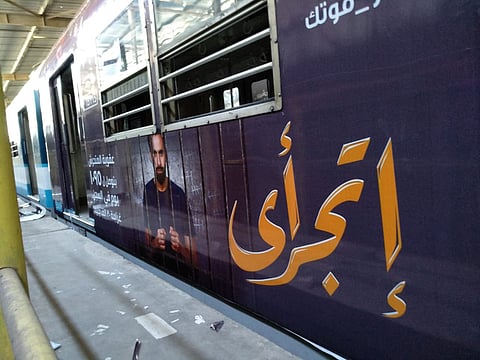Women’s rights in focus at Egypt metro stations
Campaign rallies support against harassment, underage marriage and overpopulation

Cairo: “It’s too early. No child should give birth to a child,” reads a sleek billboard at a major Cairo subway station used by millions every day in this sprawling city.
In the centre of the board, a minor girl appears sad as she looks at her bulging belly, signaling premature pregnancy. The advertisement is part of a state-backed campaign aimed at raising public awareness about women’s rights.
Entitled “Your Life is a Set of Stations. Don’t Get Stuck in a Station”, the campaign was recently launched by the state-appointed National Council for Women (NCW) in an attempt to draw attention of more than 3 million people who board the subway daily.
Central to the campaign, conducted in conjunction with the UN Population Fund, are four key themes related to the empowerment of females, who make up around 48.4 per cent of Egypt’s population, according to recent demographic statistics.
These themes are sexual harassment, underage marriage, repeated birth-giving and encouragement of women’s work, NCW officials said.
“The campaign targets both men and women of different age groups,” said NCW chairwoman Maia Mursi. “The campaign seeks to encourage the woman to pursue her dreams and make well-studied decisions. At the same time, the man is required to support the woman in fulfilling her dreams. The overriding aim is to educate people about women’s rights and promote her empowerment in economic, social and health fields,” Mursi said in a statement.
Signs propagating the various themes of the campaign also decorate the subway trains. “The idea of the campaign is based on a similarity between human life and the metro stations,” explained Mursi. “Human life is more or less a set of stations determined by one’s choices and decisions. The reason the subway is used for the campaign is that it is the most frequented means of public transport.”
Commuters have reacted differently to the effort. “I think the campaign will be influential as it uses attractive images and simple words in conveying its message, which is to change society’s perception of women’s rights,” said Ezzat Abdul Gani, a government employee who uses the subway regularly.
“I particularly like the campaign’s emphasis on combating sexual harassment, which is rife in crowded places,” he added, pointing to a train carrying a big image of an offender standing behind bars with the penalty clearly stated alongside. The sign, spread across the body of the train, also tells women to “Be Bold” and report to authorities about the offenders.
“It is also good that the campaign encourages girls to speak out against harassment and promises them legal support,” Abdul Gani told Gulf News.
Sexual harassment is a serious problem in Egypt. A 2013 UN report found that 99.3 per cent of women in Egypt have experienced some form of sexual harassment. Conservatives usually blame victims, prompting many of them to shun reporting the offence to authorities for fear of social disgrace.
In recent years, Egyptian authorities and civil society groups have stepped up efforts to combat the offence. Under recent legal amendments, sexual harassment in Egypt is punishable by jail terms of up to 10 years.
Egyptian courts have recently issued tough jail sentences in different cases of sex assaults. The verdicts were passed following a short number of hearings. Previously, such cases took many years before a ruling was delivered.
Waiting for a train to get home from the main station of Al Shuhada in central Cairo, Adel Metwaly, a father of two, attentively looked at a billboard focusing on overpopulation, a big problem for Egypt.
The board shows a father with his empty pocket inside out surrounded by his five children, while his wife sits on the ground covering her face in disappointment.
“The message is clear and simple: Having too many children is not good, especially in these hard times, when life has become very expensive,” commented Metwaly, an owner of a bookshop in the north Cairo area of Road Al Farag.
“Unless we seriously practise family planning, this overcrowding will get worse in the next few years,” he added, pointing at dozens of travellers cramming the platform.
Egypt has a population of 104 million, including over 9 million living outside the country, according to an official census released last year.
The country’s population increases by about 2.5 million every year, a rate that experts say threatens to derail national development plans.
In recent months, the government has launched a campaign aimed at encouraging families to have two children at most instead of the average four.
Prime Minister Mustafa Madbuly has recently said his government is considering incentives to small families as some lawmakers have proposed penalties against larger families, including cuts in free education and healthcare services.
For Marwa Fouad, a Cairo University student, the current campaign at the subway is misplaced.
“Stations, where the billboards are erected, are always so crowded that the passengers have no time or patience to look at them,” she said. “Moreover, these boards do not cover all other stations of the metro to ensure its message will reach the biggest numbers of people. High-sounding slogans have led us nowhere before. And they will be of no use this time,” Marwa added.
“If we are really serious about dealing with such problems as harassment or population explosion, we have to search for their roots where they originate – in poor and marginalised areas.”



